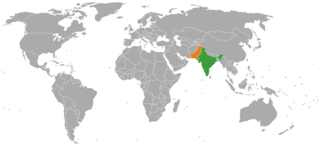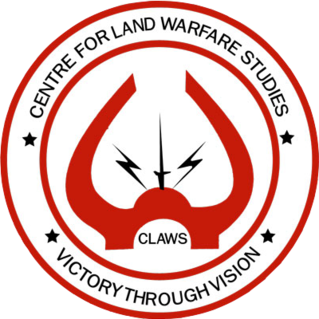
Nuclear proliferation is the spread of nuclear weapons, fissionable material, and weapons-applicable nuclear technology and information to nations not recognized as "Nuclear Weapon States" by the Treaty on the Non-Proliferation of Nuclear Weapons, commonly known as the Non-Proliferation Treaty or NPT. Proliferation has been opposed by many nations with and without nuclear weapons, as governments fear that more countries with nuclear weapons will increase the possibility of nuclear warfare, de-stabilize international or regional relations, or infringe upon the national sovereignty of nation states.

The South Asian Association for Regional Cooperation (SAARC) is the regional intergovernmental organization and geopolitical union of states in South Asia. Its member states are Afghanistan, Bangladesh, Bhutan, India, Maldives, Nepal, Pakistan, and Sri Lanka. SAARC comprises 3% of the world's land area, 21% of the world's population and 5.21% of the global economy, as of 2021.

The Pugwash Conferences on Science and World Affairs is an international organization that brings together scholars and public figures to work toward reducing the danger of armed conflict and to seek solutions to global security threats. It was founded in 1957 by Joseph Rotblat and Bertrand Russell in Pugwash, Nova Scotia, Canada, following the release of the Russell–Einstein Manifesto in 1955.

Stockholm International Peace Research Institute (SIPRI) is an international institute based in Stockholm. It was founded in 1966 and provides data, analysis and recommendations for armed conflict, military expenditure and arms trade as well as disarmament and arms control. The research is based on open sources and is directed to decision-makers, researchers, media and the interested public.
There are two annual conferences that go by the title of the Asia Security Conference. The oldest of these is held by the Indian think tank Institute for Defence Studies and Analyses (IDSA) in New Delhi, India. This conference brings together globally renowned scholars who interact with senior members of IDSA as well as senior members of the Indian Government. The 12th Annual Asian Security Conference was hosted by IDSA from 11 to 13 February. These conferences are by invitation only. At the 2010 Conference, the Indian Defence Minister and Indian Defence Secretary both played key roles. The conference annually explores issues of security affecting South Asia. Attendees for the 2010 Conference included senior academics from the United States, Pakistan, Russia, Iran, India, and the United Kingdom, among others. Notable names included G. John Ikenberry, and Aaron Friedburg from Princeton, Summit Ganguly from the Indiana University, John Geis from Air University.

The Netherlands Institute of International Relations Clingendael or Clingendael Institute is a Dutch think tank and academy on international relations. Based in Wassenaar on the municipal border with The Hague, the institute also publishes Clingendael Magazine 'Spectator', an online monthly on international politics. As of 2012, the institute is organised into two departments: Clingendael Research and Clingendael Academy.
Oxford Research Group (ORG) was a London-based charity and think tank at 244–254 Cambridge Heath Road, London, E2 9DA, working on peace, security and justice issues. Its research and dialogue activities were mainly focused on the Middle East, North and West Africa, as well as influencing UK and international security policy.
The S. Rajaratnam School of International Studies (RSIS) is an autonomous graduate school in Singapore, and policy-oriented think tank within the Nanyang Technological University (NTU). Founded in 1996 as the Institute of Defence and Strategic Studies, RSIS offers graduate education in international affairs, taught by an array of international faculty. The school is named after former Deputy Prime Minister S. Rajaratnam.
The Stimson Center, named after American statesman, lawyer, and politician Henry L. Stimson, is a nonprofit, nonpartisan think tank which aims to enhance international peace and security through a combination of analysis and outreach. The center's stated approach is pragmatic – seeking to provide policy alternatives, solve problems, and overcome obstacles toward a more peaceful and secure world.

United Nations Security Council resolution 1172, adopted unanimously on 6 June 1998, after hearing of nuclear tests conducted by India and Pakistan in May 1998, the Council condemned the tests and demanded that both countries refrain from engaging in further tests.
Zia Mian is a Pakistani-American physicist, nuclear expert, nuclear policy maker and research scientist at Princeton University.
Salma Malik is a teacher at the Department of Defence and Strategic Studies, Quaid-e-Azam University in Islamabad, Pakistan.

Dr. W. Lawrence S. Prabhakar, M.A, Ph.D. is an Associate Professor of Strategic Studies and International Relations in the department of Political Science at Madras Christian College, India and Adjunct Research Fellow, S.Rajaratnam School of International Studies, Nanyang Technological University, Singapore.
Hekmat Khalil Karzai is the deputy foreign minister of Afghanistan. He was appointed as the deputy foreign minister on 21 January 2015.

United Service Institution of India (USI) is a national security and defence services think tank based in New Delhi, India. It describes its aim as the "furtherance of interest and knowledge in the art, science and literature of the defence services".

Commodore Chitrapu Uday Bhaskar is a retired military officer who served in the Indian Navy. He is one of India's leading experts and outspoken critics on security and strategic affairs.
Minimum Credible Deterrence is the defence and strategic principle on which the atomic weapons programme of Pakistan is based. This doctrine is not a part of the nuclear doctrine, which is designed for the use of the atomic weapons in a full-scale declared war if the conditions of the doctrine are surpassed. Instead, the policy of the Minimum Credible Deterrence falls under minimal deterrence as an inverse to the Mutually Assured Destruction (MAD), which is widely regarded as designed to dissuade India from taking any military actions against Pakistan, as it did in 1971, when Pakistan started the war. Pakistan refuses to adopt No first use policy, while the other regional powers India and China had adopted the policy. Pakistan's foreign minister Shamshad Ahmad had warned that if Pakistan is ever invaded or attacked, it will use "any weapon in its arsenal" to defend itself.

The Centre for Land Warfare Studies (CLAWS), New Delhi, India is an autonomous think tank on strategic studies and land warfare. The mandate of CLAWS covers national security issues, conventional military operations and sub-conventional warfare. CLAWS is registered under the Societies Registration Act, 1860 and is a membership-based organisation. It is governed by a Board of Governors and an Executive Council. Research at CLAWS is futuristic in outlook and policy-oriented in approach. CLAWS disseminate the products of its research to its members, members of the armed forces, decision makers, members of the strategic community and interested civilians. It also seeks to contribute to developing a pro-active strategic culture for India. The objective of the organization is to convey policy recommendations based on interactions, consensus and research projects to policymakers and experts. CLAWS has been ranked 67th amongst World Top Defence and National Security Think Tanks as per '2017 Global Go To Think Tank Report' published by University of Pennsylvania, USA.

Saferworld is an international non-governmental organisation with conflict prevention and peacebuilding programmes in over 20 countries and territories in the Horn of Africa, the African Great Lakes region, Asia, the Middle East, Central Asia and the Caucasus. It was founded in Bristol, UK in 1989 and now has its main office in London.

Dr. Rifaat Hussain is a Pakistani political scientist, professor, defense analyst and television personality whose career in the academia spans over four decades. Hussain served as the executive director of the Regional Centre for Strategic Studies (RCSS) from 2005 to 2008, a Colombo-based think tank in Sri Lanka, and spent two terms as visiting professor at Stanford University’s Center for International Security and Cooperation (CISAC). The New York Times Magazine has described Hussain as a "leading Pakistani foreign policy thinker."











